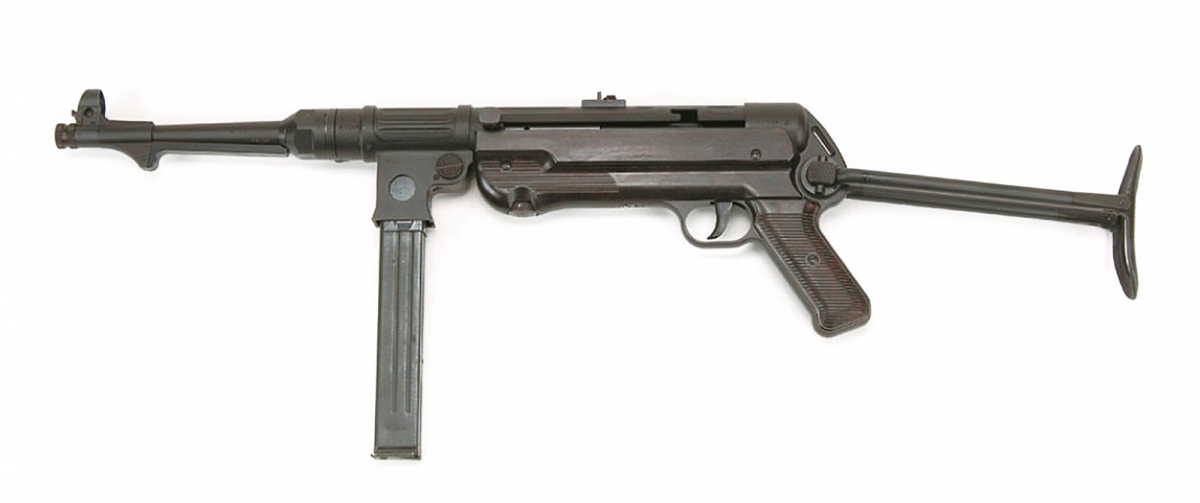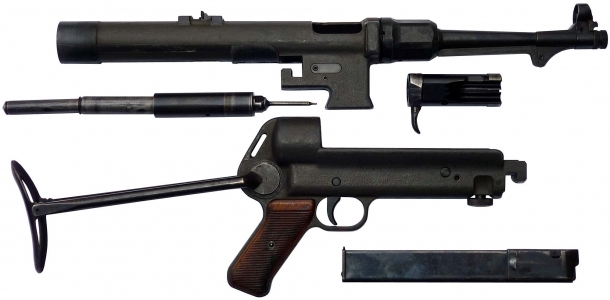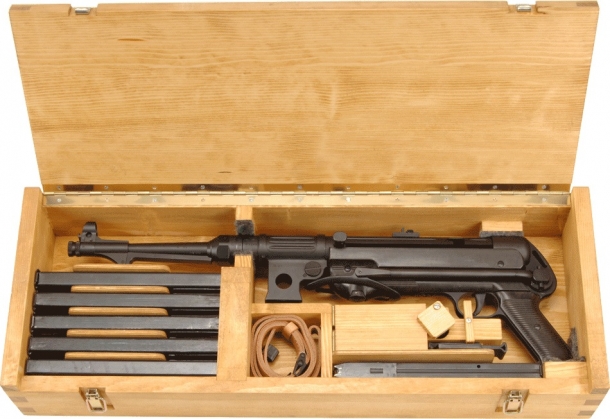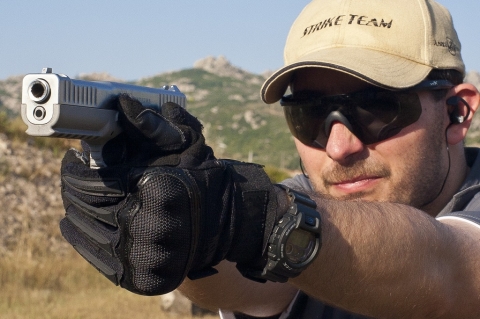Sport Systeme Dittrich BD 38: the "Schmeisser" is back!
The forerunner of the iconic MP 40 sub-machine gun is back in a collector's grade, made-as-new semi-automatic closed-bolt version that would be civilian-legal in many jurisdictions – if you can afford it, that is
Sport Systeme Dittrich out of Kulmbach (Germany) manufactures the BD 38, a civilian-grade version of the MP 38 sub-machine gun
Sport Systeme Dittrich first introduced the BD 38 in 2005
The MP 38 sub-machine gun was first engineered in the second half of the 1930s by Heinrich Vollmer, an engineer at ERMA-Werke in Erfurt, Germany. Based upon the MP 36 design by Berthold Geipel – ERMA's founder and owner – the MP 38 also integrated some features from Vollmer's signature projects such as the EMP machine-carbine and the prototype VPM 1930.
Fast-tracked for adoption by the German Wehrmacht in 1938 and used extensively during the first year of World War II, the MP 38 was later modified upon suggestions from the German Army itself to make it cheaper and faster to produce by the numbers.
That would gave origin to the iconic MP 40 sub-machine gun, whose service years did not stop with the demise of Nazi Germany but continued in many Countries for years, with countless armies and several insurgent, guerrilla and even terrorist groups extensively relying upon the MP 40 up until at least the 1970s.
The MP 38 and MP 40 were often incorrectly refered to as the "Schmeisser" by Allied forces, and the name stuck in popular culture. However, neither Hugo nor Louis Schmeisser had anything to do with the development of either variants, although Schmeisser's patented magazine was used.
A close-up of the Bakelite grip and frame wrap
In modern times, the MP 38 has become one of the many historical firearms made available to civilian shooters, collectors and re-enactors thanks to Sport Systeme Dittrich, a gunmaker headquartered in the German town of Kulmbach.
Sport Systeme Dittrich carried on a fine work tracing back the original blueprints and even some of the original manufacturing machineries to manufacture and launch a line of historical firearms whose high level of compliance to the original designs and quotas quickly rose to popularity and success among gun enthusiasts worldwide.
Among those historical replicas is the BD 38 – a civilian-grade, semi-automatic version of the original MP 38 sub-machine gun that has been made available in 9mm Luger for international commercial sales and in 9x21 IMI for those Countries where 9x19mm is forbidden or restricted to civilians.

The Sport Systeme Dittrich BD 38, seen from the left side
The Dittrich BD 38, seen with its underfolding stock extended
Depending from local laws and regulations, the Sport Systeme Dittrich BD 38 can be classified as a handgun or as a long gun. Configuration may thus vary depending from local provisions concerning the features of handguns, long guns, and short-barrel rifles: it may feature a fully extensible underfolding stock, or it could be locked permanently in the unfolded or folded position, or totally removed; or it could feature a permanent barrel extension.
Technically speaking, the Sport Systeme Dittrich BD 38 is a semi-automatic, locked-breech firearm. The original working system was tinkered with to adapt the design for civilian sales, and that was pretty much the only design change that tells the BD 38 apart from the MP 38.
Originally, Sport Systeme Dittrich also offered a semi-automatic open-bolt variant of the BD 38. It however went out or production after some Countries – chiefly Canada – issued ban-and-confiscation orders on grounds that an open-bolt firearm could be "too easily converted to full-automatic fire".
The closed-bolt version is of course technically much different from the open-bolt variant, and could not pose such a problem (if the open-bolt version ever did at all). This means that the closed-bolt variant could be viable for import in those Countries that banned the early open-bolt variant.
A close-up of the ejection port
Sport Systeme Dittrich still manufactures the new closed-bolt version basing on the original blueprints and largely using original techniques and materials.
The entire upper receiver – which hosts the magazine well, the bolt group, and the barrel – is entirely machined out of steel and entirely brunished. The frame is instead manufactured out of aluminum, and features a reddish bakelite shell; the same material is used for the grip panels.
The 24,8 cm (9.76") barrel features six right-handed grooves, as well as a hooded blade front sight and the quintessential frontal support for firing from a fixed position. The rear leaf sight is instead mounted on the upper portion and can be set to engage targets within 100 or 200 metres.
The hooded front blade sight of the BD 38, just over the quintessential support
The adjustable rear leaf sight, adjustable for shooting at 100 or 200 metres

An original MP 38(l) sub-machine gun, field-stripped: the BD 38 strips basically in the same way
The Sport Systeme Dittrich BD 38 field-strips just like the MP 38 and MP 40 sub-machine guns – just as one would expect from a live-firing replica that has been designed and manufactured with the intent to stick as much as possible to the original design.
Following is a visual guide highlighting the six steps required to field-strip this absolutely perfect modern replica of a firearm that wrote history.
Once the magazine has been removed and the chamber has been checked clear, the disassembly nut must be unscrewed
Before proceeding, make sure that the bolt is well forward in a fully locked position
As soon as the disassembly nut has been unscrewed, the top portion can be twisted clockwise and separated from the frame
This provides access to the bolt carrier group for cleaning and maintenance
All the BCG components are machined out of steel, just like in the original MP 38
The components are separated; the return spring also dubs as a recoil buffer
The magazine release catch is located on the left side
A nut under the frame can be unscrewed to field-strip the BD 38
The underfolding stock design of the MP 38 / MP 40 would go on to inspire that of the AKMS assault rifle
Just like the original MP 38 and MP 40 sub-machine guns, the BD 38 comes with an underfolding steel stock that's locked and unlocked through a prominent button located on the right side of the frame, just over the pistol grip. The stock is sturdy enough, and coupled with the robust return spring that dubs as a recoil buffer, it provides stability and accuracy in aimed rapid fire. Firing the BD 38 will be a pleasurable shooting experience, and results on target will be more than satisfying.
Sport Systeme Dittrich manufactures several types of double-stack magazines for the BD 38, ranging from 10 or 15 rounds to 32 rounds. Even two-rounds magazines are available, as two shots is the maximum legal capacity for semi-automatic firearms owned under a hunting license in Germany. However, if you live in a Country where World War II militaria is readily available and not too expensive, you will be pleased to know that the gun does fit the original MP 38 and MP 40 magazines.
An excellent replica, great at the range: enthusiasts and collectors, seek no further!

The BD 38's wooden box includes a sling, various magazines, and several other accessories
Just like all other historical replicas offered by Sport Systeme Dittrich, the BD 38 is an excellent gun. Once again, we stress: this is not a demilitarized firearms (a former full-auto converted to semi); it's not a cheap reproduction and it's not a replica rebuilt partially from stock components. The BD 38 was rebuilt from the ground up, and the company spent an awful lot of time, and money, gearing up for the production of a reproduction that would be just as faithful to the original as it could ever get.
And that's where the two disadvantages of the BD 38 stem from.
The first is availability: the BD 38 may be very hard to get in several jurisdictions, and even where it's legal, it may have been imported in a very small amount. In some European Countries, only a handful of samples were ever distributed.
The second is price: all those studies to come out with a perfect replica, all that great work, original machineries and blueprints, high-quality materials, all comes to a price. And that price can be as high as 4000 Euros in some European Countries. That's definitely not something for everybody. But those who can get to buy one, will never ever repent.
Sport Systeme Dittrich BD 38 - Technical specs
BD 38
Semi-automatic pistol or semi-automatic carbine, depending from local regulations
9x19mm, 9x21 IMI
Semi-automatic, locked breech
Single action
Cocking handle safety blocks the movement of the bolt carrier group
2, 10, 15 or 32 rounds in double-stack magazines
248 mm / 9.76"
Fixed hooded front blade, adjustable rear sight
- 625 mm / 24.6" with stock underfolded or without stock
- 856 mm / 33.7" with stock extended
4,43 kg / 9.76 lbs
Steel, aluminum, Bakelite
See your dealer for local availability and price


